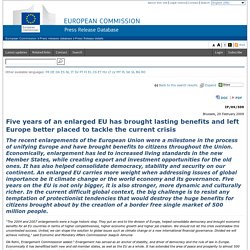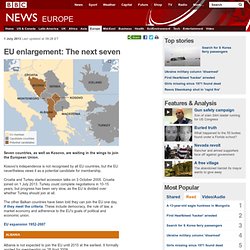

Vienna 2012. EYP Austria is excited to host the 13th Austrian National Conference 2012, the Youth Summit on Generations & Integration. The session will take place in Vienna from the 26. to the 30. April 2012. Under the motto ‘Bridge the gap!’ , the session’s topics will deal with integration (immigration, etc.) issues as well as multiple generations, inspired by 2012 as the European Year for Active Ageing (…and solidarity between generations). The session is supported by Youth in Action. (Legal code of conduct, return to vienna2012@eypaustria.org) Viewpoint: EU enlargement woes. The economic crisis is fuelling opposition to further EU enlargement. Yet the price of delay could be instability and deepening poverty, Katinka Barysch, Deputy Director of the Centre for European Reform argues.
This is part of a series of opinion pieces ahead of the June European elections. The queue for EU membership keeps getting longer. The 27-nation EU has accepted Turkey, Bosnia-Hercegovina, Croatia, Serbia and other Balkan countries as potential candidates. Recession-battered Iceland may follow. Former Soviet countries such as Ukraine and Georgia have been told that they need to improve a lot before the EU will consider them as candidates. To celebrate the fifth anniversary of eastward enlargement, the EU's Enlargement Commissioner Olli Rehn released a report in February that explained how both the new members and the "old" EU have gained from integrating with each other. Eastern progress The biggest winners have been the new members themselves. Stumbling blocks Bilateral disputes. The Impact of the Economic Crisis on EU Enlargement and Eastern Partnership.
Five years of an enlarged EU has brought lasting benefits and left Europe better placed to tackle the current crisis. Brussels, 20 February 2009 “The 2004 and 2007 enlargements were a huge historic step.

They put an end to the division of Europe, helped consolidate democracy and brought economic benefits for all EU countries in terms of higher competitiveness, higher economic growth and higher job creation. We should not let the crisis overshadow this uncontested success. United, we can shape the solution to global issues such as climate change or a new international financial governance. Divided we will achieve nothing," said Economic and Monetary Affairs Commissioner Joaquín Almunia Olli Rehn, Enlargement Commissioner added:" Enlargement has served as an anchor of stability, and driver of democracy and the rule of law in Europe. It has been five years since the EU took in 10 new Members[1[1]] from Central and Eastern Europe, putting an end to several decades of division brought about by the Cold War. Enlargement also increased trade opportunities. Full Communication and analytical report available on:
Enlargement. Center for EU Enlargement Studies. EU enlargement: The next eight. 1 July 2013Last updated at 09:28 ET Seven countries, as well as Kosovo, are waiting in the wings to join the European Union.

Kosovo's independence is not recognised by all EU countries, but the EU nevertheless views it as a potential candidate for membership. Croatia and Turkey started accession talks on 3 October 2005. Croatia joined on 1 July 2013. Turkey could complete negotiations in 10-15 years, but progress has been very slow, as the EU is divided over whether Turkey should join at all. The other Balkan countries have been told they can join the EU one day, if they meet the criteria. EU expansion 1952-2007 Albania is not expected to join the EU until 2015 at the earliest. Since 15 December 2010 Albanians with biometric passports have been able to travel visa-free to the Schengen zone, which includes most EU countries.
Border controls are minimal under the Schengen accord, but the EU will keep a close watch on the flow of visitors from the Western Balkans. Albania country profile.